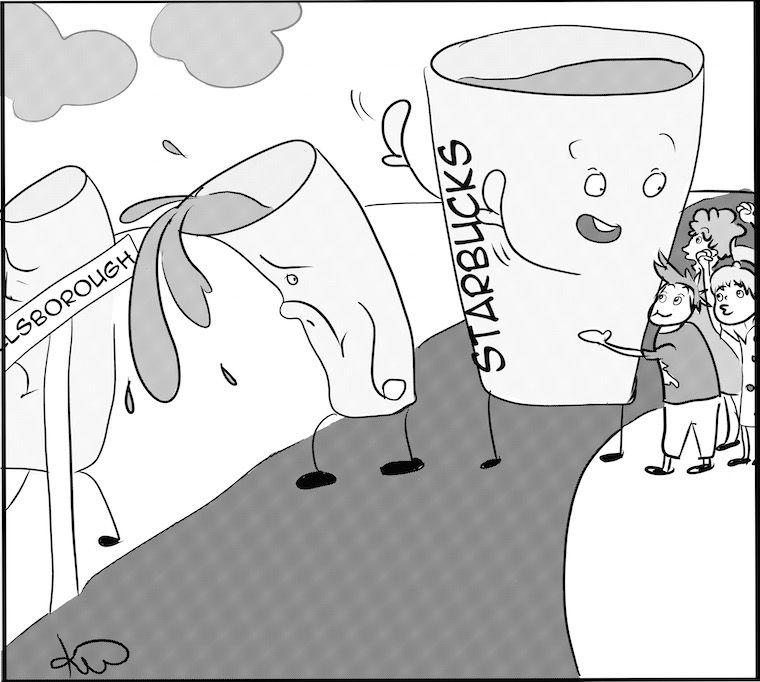
Kelley Wheeler, junior studying art studies
Recently, yet another Starbucks opened its doors. Their new location? None other than Talley Student Union. The new site originally received very positive traffic, mostly from Caucasian females in the 18-24 demographic ordering predominantly the Venti Sugarcane-extract Frappuccino. However, in the past couple of days, the store has started to gather protestors from an ideologically diverse spectrum of student organizations.
“It’s just bad economics,” said Clifford Lexington, senior in the Poole College of Management and co-secretary of NC State’s Entrepreneurship Initiative. “North Carolina State University prides itself on being an ally to business and upstart entrepreneurs. But at the same time, it pulls this move against small local coffee shops? For shame, man, for shame,” Lexington lamented.
Lexington, who recently published a paper that analyzes the coffee market of Ankazobe, Madagascar, described the process of market saturation. A market is said to be saturated when a good has been thoroughly diffused within a location. As such, in this situation, a company cannot grow its market share without drawing from another company. NC State’s campus already has an oversized fleet of Port City Javas, many decent “mom and pop” coffee shops, sketchy pep pill pushers and uncountable Keurig machines that are fully capable of satisfying the university’s rather large demand for caffeine.
“Starbucks is a serious threat to the carefully cultivated culture of Hillsborough Street. Its ubiquitous brand recognition, convenient location in Talley and sophisticated supply line give the franchise significant advantages over the smaller stores and can potentially run them out of business. In the past, Starbucks has been notorious for undercutting local competition using ethically ambiguous measures rather than providing a genuinely superior product. A place like Global Village or Cup A Joe could benefit the students significantly more with a franchise in the Talley location. Plus, they could’ve actually served a drinkable cup of coffee that’s less acidic than concentrated hydrogen chloride.”
Lory McGilless, director of marketing and communication for Campus Exploitations Enterprises, disagreed with Lexington’s stance. “In the well-formulated opinion of us higher education technocrats, it’s completely fine that there are two coffee shops in Talley; it’s totally reasonable and sane,” she said. “Port City Java offers more overpriced food options than Starbucks. Honestly, we’re just branching out and trying to provide something that every student would complacently tolerate without too much protest.”
McGilless denied being on the payroll for Starbucks.
In addition to the dozen protesters from the Entrepreneurship Initiative, 20 members of the College Marxists joined the fight in front of the Starbucks. Slavoj Keziz, junior in philosophy and chapter president, spoke for the group: “Besides their coffee tasting like a combination of mud and rust with undertones of coke ash, Starbucks is an affront to the dignity of man.
“The corporation does not treat its baristas like decent men and women, but rather as mechanical sources of labor value. They are not instructed to think creatively about the brewing of coffee drinks or see the fruits of their labor in the final product. These poor laborers are forced to don their khakis and aprons and press a series of buttons and pumps to manufacture a preconfigured beverage created by some tasteless bureaucrat in Seattle. They are paid meager wages and given some trivial stock options in exchange for selling their labor value, their very essence,” droned Keziz.
“Besides exploiting the surplus labor value of the proletariat, Starbucks has established its brand through ‘ethical capitalism.’ Have you ever noticed how they advertise that they are donating some infinitesimally small percent of proceeds to some indisputably good charity such as Guatemalan children or the troops? Now you, as the drinker of Starbucks coffee no longer feel like an empty consumer of over-sugared coffee, but you rationalize your purchase under the perverted guise of philanthropy. The old platitude goes ‘you are what you eat.’ In this case, you, my friend, are pure consumerist ideology.” Keziz continued to rant on his soapbox about commodity fetishism for another 20 minutes, but this reporter ran out of space on his tape recorder.
Louise Kasterson, University Dining’s director of something, said the following in response to Keziz: “Keziz sounds like he has read too much philosophy. He’s implying that there are problems when there are none. It’s very simple. NC State students will enjoy the new Starbucks because we, the omniscient administrators, tell them they will. If they disagree with us, they’re no better than Tarheels!”
Kasterson continued, “Also, NC State students will surely enjoy the Toffee Mocha Peppermint Macchiatoccino with whipped cream! The hectograms of sugar in the drink coupled with the gluttonous amounts of chocolate will not only mask the unbearable bitterness of the dragon blend, but also give you enough energy to get through your morning class and power a small town.”
Disclaimer: Technician is bringing back “The Fifth,” satire columns. Don’t take it too seriously.